The Intel SSD 545s (512GB) Review: 64-Layer 3D TLC NAND Hits Retail
by Billy Tallis on June 27, 2017 6:00 AM ESTBAPCo SYSmark 2014 SE
BAPCo's SYSmark 2014 SE is an application-based benchmark that uses real-world applications to replay usage patterns of business users in the areas of office productivity, media creation and data/financial analysis. In addition, it also addresses the responsiveness aspect which deals with user experience as related to application and file launches, multi-tasking etc. Scores are calibrated against a reference system that is defined to score 1000 in each of the scenarios. A score of, say, 2000, would imply that the system under test is twice as fast as the reference system.
SYSmark scores are based on total application response time as seen by the user, including not only storage latency but time spent by the processor. This means there's a limit to how much a storage improvement could possibly increase scores, because the SSD is only in use for a small fraction of the total test duration. This is a significant difference from our ATSB tests where only the storage portion of the workload is replicated and disk idle times are cut short to a maximum of 25ms.
| AnandTech SYSmark SSD Testbed | |
| CPU | Intel Core i5-7400 |
| Motherboard | ASUS B250-PLUS |
| Chipset | Intel B250 |
| Memory | 2x 8GB Kingston DDR4-2400 CL17 |
| Case | In Win C583 |
| Power Supply | Cooler Master G550M |
| OS | Windows 10 64-bit, version 1703 |
Our SSD testing with SYSmark uses a different test system than the rest of our SSD tests. This machine is set up to measure total system power consumption rather than just the drive's power.
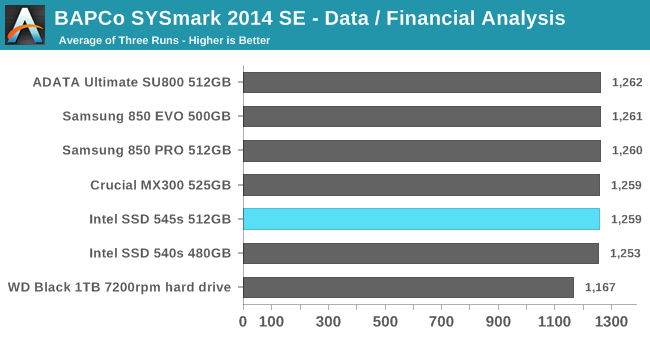
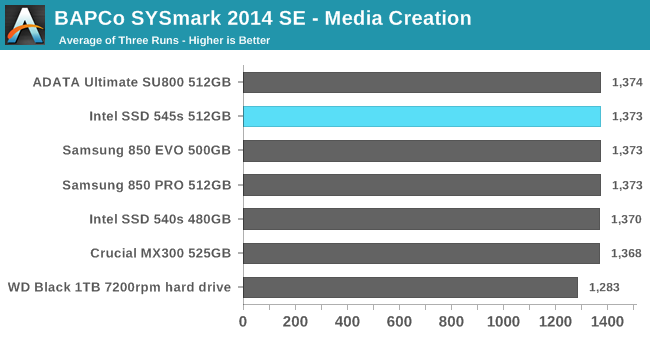
The SYSmark performance scores for data analysis and media creation are relatively insensitive to storage performance, as shown by our test system's score with a mechanical hard drive exceeding the normalized score of 1000 for the SYSmark reference system that uses a SSD and coming relatively close to the performance of our SSDs. The differences between these SATA SSDs are all within the variation between runs.
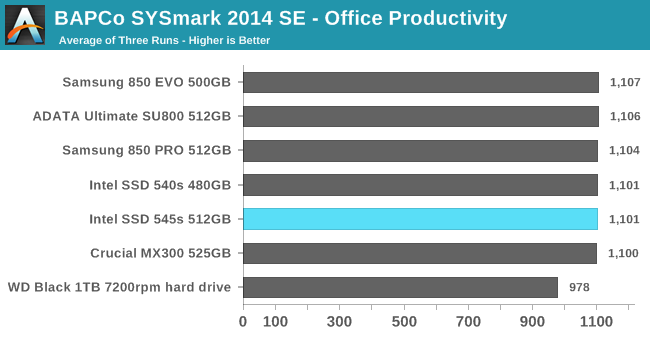
The office productivity test also shows very little dependence on storage performance, but the gap between the SSDs and the hard drive is a bit wider than for the first two usage scenarios, and the hard drive's detrimental impact on performance was enough to offset the CPU and RAM advantages our testbed has relative to the SYSmark 2014 SE reference system.
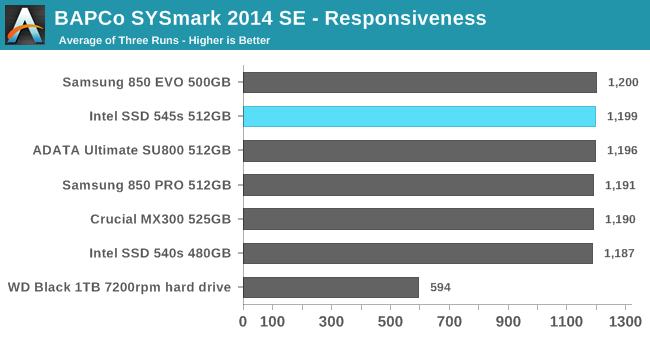
The SYSmark responsiveness benchmark is the most sensitive to storage performance, and all of the SATA SSDs are about twice as fast as the mechanical hard drive. The difference between SSDs is just barely larger than the variation between test runs, but it's enough that the slowest of the three runs for the 545s was faster than the fastest of the three runs for the Intel 540s.
Energy Usage
The SYSmark energy usage scores measure total system power consumption, excluding the display. Our SYSmark test system idles at around 26 W and peaks at over 60 W measured at the wall during the benchmark run. SATA SSDs seldom exceed 5 W and idle at a fraction of a watt, and the SSDs spend most of the test idle. This means the energy usage scores will inevitably be very close. A typical notebook system will tend to be better optimized for power efficiency than this desktop system, so the SSD would account for a much larger portion of the total and the score difference between SSDs would be more noticeable.
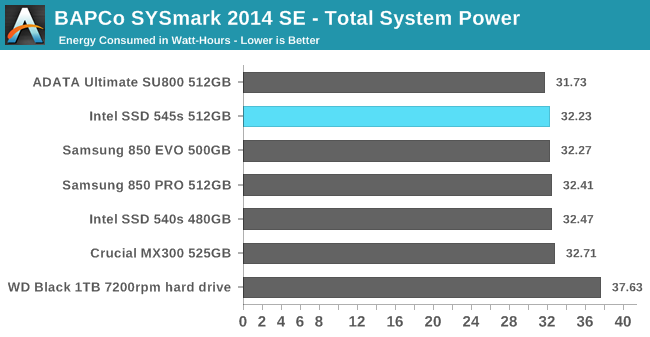
Rather than judging these scores by their percentage difference, it's probably more useful to consider the raw number of Watt-hours saved by using a more efficient SSD. The difference here between the best and worst SSD is just under 1 Wh, compared to a typical ultrabook battery capacity of around 50 Wh. Since the overall performance scores with each SSD were so close together, we know that the test runs took essentially the same amount of time and the differences in energy usage are due mostly to differences in the idle power consumption of the SSDs.










74 Comments
View All Comments
ddriver - Tuesday, June 27, 2017 - link
Actually yes. Way to go intel...anactoraaron - Tuesday, June 27, 2017 - link
What's wrong with the 600p? You can get the 512gb from newegg for $179, which make me question the 545s price point. If you aren't limited to sata, the 600p 512gb makes much more sense.ddriver - Tuesday, June 27, 2017 - link
"What's wrong with the 600p? "Nothing, aside from the fact it is THE lousiest NVME SSD in the known universe...
Drumsticks - Tuesday, June 27, 2017 - link
Good thing it generally sells at SATA prices then...junky77 - Wednesday, June 28, 2017 - link
It's really not even as fast as SATA SSDs in many tests (I'm talking midrange SSDs, nothing fancy)kaidenshi - Wednesday, June 28, 2017 - link
I've seen a ton of hate for the 600p here, and I can only conclude that I got extremely lucky with mine and ended up with a fluke. Mine has been hands down the fastest SSD I've ever had, and even paired with a bargain-basement Pentium G4500 CPU, it makes everything on my PC feel instant.Perhaps it is the slowest NVMe SSD one can buy, but it is much, much faster than any SATA SSD I've had in this machine. It definitely blows the doors off the 850 Evo, despite claims I've seen here that it's slower. The results on this site mirror what I've seen in my own testing. Basically, the Samsung beats the Intel on random reads only, but loses spectacularly on all other metrics.
http://ssd.userbenchmark.com/Compare/Samsung-850-E...
Samus - Thursday, June 29, 2017 - link
It isn't a speed demon, but it isn't slow either. It's just what you'd expect for the price.And it's sequential transfer rates are substantially faster than anything SATA, so that is the icing on the cake for an SSD that sells for SATA prices.
And being Intel, I expect it will be ultimately more reliable than a similar priced product form ADATA, etc.
alpha754293 - Thursday, June 29, 2017 - link
What's wrong with the Intel 750 series PCIe NVMe SSDs?futrtrubl - Tuesday, June 27, 2017 - link
I'm going to assume the sustained sequential write speed of 40MB/s is a typo.futrtrubl - Tuesday, June 27, 2017 - link
Oh wow, I see it is not.